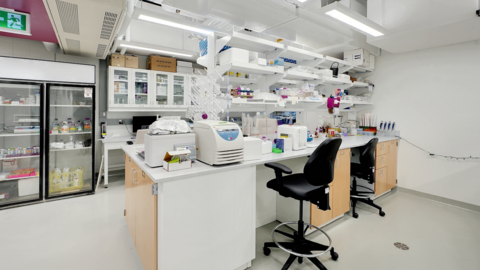
Along with collaborators from the University of Guelph, Dr. Dale Martin, biology professor, was awarded $150,000 from the Navigator Research funding program from the Huntington Society of Canada (HSC) for their research project DLK as a novel therapeutic target to treat Huntington Disease.
Huntington Disease (HD) is a devastating progressive neurodegenerative disease. It’s an inherited disease caused by cells dying in a specific area of the brain. As these cells die, affected patients progressively lose control of their movement and have difficulties related to memory, decision-making, and emotions.

Working with Dr. Shaun Sanders and Dr. Melanie Alpaugh (University of Guelph), they will explore the role of the protein dual leucine zipper kinase (DLK) in Huntington disease (HD) using genetic approaches to lower DLK in HD models, including patient-derived cells. DLK is required to tell special cells of the brain, known as neurons, to die. Inhibitors of DLK have been developed to potentially treat spinal cord injuries and are now also being tested in preclinical studies for amyotrophic lateral sclerosis (ALS) with potential application to Alzheimer and Parkinson diseases. Although there is evidence that links DLK to cell death signals in HD, no studies have investigated if stopping the action of DLK could be beneficial in HD.
“We are thrilled to have this opportunity to delve into this new area of research in Huntington disease,” says Dr. Martin. “The experience of this next generation team of HD researchers perfectly aligns with the goals of the Navigator award. We hope this will help us identify new pathways for therapeutics in HD. As new DLK inhibitors emerge, we will be poised to repurpose them for HD.”
The HSC Navigator Award funding ($150,000 over two years) will enable this team to explore this area that could benefit thousands of Canadians. The HSC was founded in the Kitchener-Waterloo area over 50 years ago and has been critical in driving Canadian HD Research teams, while also providing critical support for patients and families in the region and across Canada.
“We are really lucky to be centrally located with so many other talented early career researchers right at the heart of the HSC community,” said Dr. Martin. “We are always interested in connecting with the HD community, by hosting events and providing lab tours. It’s important to share what we do with patients and their families.”
Congratulations to Dr. Martin, Dr. Sanders, and Dr. Alpaugh!
___________________________________
For those inspired to contribute to this crucial work, we invite you to connect with Science Advancement to learn how your generosity can make a meaningful impact. Philanthropic support is transformative in advancing scientific research and enabling groundbreaking discoveries that can change lives.